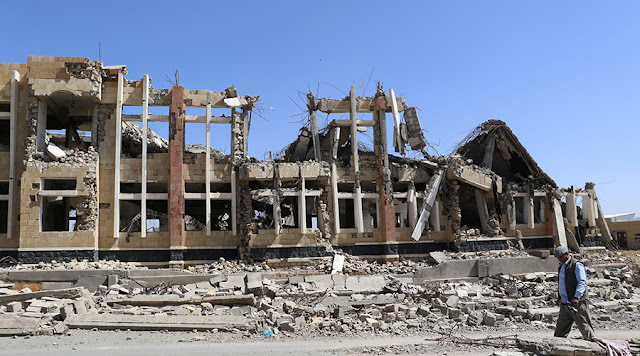MOHAMMED AWADH/ SAVE THE CHILDREN
A 14-month-old child suffering from malnutrition receives treatment at a clinic in the city of Amran
A further one million children are at risk of famine in Yemen, the charity Save the Children has warned.
Rising food prices and the falling value of the country's currency as a result of a civil war are putting more families at risk of food insecurity.
But another threat comes from fighting around the key port city of Hudaydah, which is the principal lifeline for almost two-thirds of the population.
Save the Children says a total of 5.2 million children now face famine.
The conflict in Yemen has been raging for years - but what is it all about?
Yemen has been devastated by a conflict that escalated in early 2015, when the rebel Houthi movement seized control of much of the west of the country and forced President Abdrabbuh Mansour Hadi to flee abroad.
Alarmed by the rise of a group they saw as an Iranian proxy, Saudi Arabia and eight other Arab states intervened in an attempt to restore the government. They have received logistical and intelligence support from the US, UK and France.
Many families in rebel-held Yemen are reliant on food handouts from aid groups
At least 6,660 civilians have been killed and 10,563 injured in the conflict, according to the UN. Thousands more civilians have died from preventable causes, including malnutrition, disease and poor health.
The fighting and a partial blockade by the coalition have also left 22 million people in need of humanitarian aid, created the world's largest food security emergency, and led to a cholera outbreak that is thought to have affected 1.1 million people.
Why can people no longer afford food?
The war has also led to severe delays in paying the salaries of teachers and public servants, with some people receiving no wages for almost two years.
Those who are paid face food prices which are 68% more expensive than when the war began.
Meanwhile, the Yemeni riyal has lost almost 180% of its value over the same period, according to Save the Children.
Earlier this month, the currency reached its lowest value in history, placing a further burden on population.
Fears also remain of potential damage to or a blockade of Hudaydah's port as a result of the fighting.
The UN has warned that in a worst-case scenario, the battle for Hudaydah could cost up to 250,000 lives, as well as cut off aid supplies to millions of people living in rebel-held areas.
"Millions of children don't know when or if their next meal will come," the chief executive of Save the Children International, Helle Thorning-Schmidt, said in a statement.
"In one hospital I visited in north Yemen, the babies were too weak to cry, their bodies exhausted by hunger.
"This war risks killing an entire generation of Yemen's children who face multiple threats, from bombs to hunger to preventable diseases like cholera," she added.
Earlier this month, Save the Children said that more than 36,000 children could die from extreme hunger before the end of the year.
Thank you, Mr Obama for putting billions of dollars back into the hands of Iranians so they can continue to sponsor this proxy war.





















